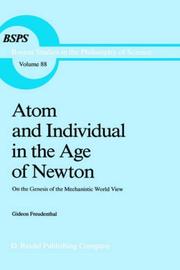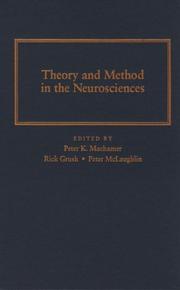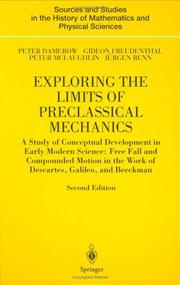| Listing 1 - 10 of 21 | << page >> |
Sort by
|

ISBN: 9780521038850 9780511498510 9780521782333 0511012470 9780511012471 0511030991 9780511030994 0521782333 0511498519 1107120691 0521038855 051115285X 1280432594 0511046243 0511173687 9786610432592 0511302150 Year: 2001 Publisher: Cambridge New York, NY Cambridge University Press
Abstract | Keywords | Export | Availability | Bookmark
 Loading...
Loading...Choose an application
- Reference Manager
- EndNote
- RefWorks (Direct export to RefWorks)
This 2001 book offers an examination of functional explanation as it is used in biology and the social sciences, and focuses on the kinds of philosophical presuppositions that such explanations carry with them. It tackles such questions as: why are some things explained functionally while others are not? What do the functional explanations tell us about how these objects are conceptualized? What do we commit ourselves to when we give and take functional explanations in the life sciences and the social sciences? McLaughlin gives a critical review of the debate on functional explanation in the philosophy of science. He discusses the history of the philosophical question of teleology, and provides a comprehensive review of the post-war literature on functional explanation. What Functions Explain provides a sophisticated and detailed Aristotelian analysis of our concept of natural functions, and offers a positive contribution to the ongoing debate on the topic.
Biology --- Social sciences --- Social philosophy --- Social theory --- Vitalism --- Philosophy. --- Arts and Humanities --- Philosophy
Book
ISBN: 0889462755 Year: 1990 Publisher: Lewiston : Mellen Press,
Abstract | Keywords | Export | Availability | Bookmark
 Loading...
Loading...Choose an application
- Reference Manager
- EndNote
- RefWorks (Direct export to RefWorks)
Antinomy --- Biology --- Philosophy and science --- Teleology --- History --- Philosophy --- Kant, Immanuel,

ISBN: 9027719055 9401085056 9400945000 Year: 1986 Volume: vol 88 Publisher: Dordrecht Boston Lancaster Reidel
Abstract | Keywords | Export | Availability | Bookmark
 Loading...
Loading...Choose an application
- Reference Manager
- EndNote
- RefWorks (Direct export to RefWorks)
Physics --- -Sociology --- -#GROL:SEMI-130.2:6 --- 5 (09) --- 539.18 <09> --- Social theory --- Social sciences --- Natural philosophy --- Philosophy, Natural --- Physical sciences --- Dynamics --- Philosophy --- Geschiedenis van wiskunde en natuurwetenschappen --- Physics of single atoms--Geschiedenis van ... --- Sociology --- Philosophy. --- 539.18 <09> Physics of single atoms--Geschiedenis van ... --- 5 <09> Geschiedenis van wiskunde en natuurwetenschappen --- #GROL:SEMI-130.2:6 --- Physics of single atoms--Geschiedenis van .. --- 5 <09> --- Physique. Philosophie. Histoire. 17e-18e s. --- Natuurkunde. Filosofie. Geschiedenis. 17e-18e eeuw.
Book
ISBN: 1473860768 147386075X 1473860741 9781473860742 9781473860735 1473860733 9781473860766 Year: 2015 Publisher: Barnsley, South Yorkshire
Abstract | Keywords | Export | Availability | Bookmark
 Loading...
Loading...Choose an application
- Reference Manager
- EndNote
- RefWorks (Direct export to RefWorks)
"Fifty years on, this superb and exciting book depicts the military history of Southern Rhodesia from the first resistance to colonial rule, through the period of UDI by the Smith government to the Lancaster House agreement that transferred power. There are vivid accounts of the operations against the black nationalist 'guerillas' by the security forces and the intensity of the fighting and courage of the participants will surprise and enthrall readers. Atrocities were undoubtedly committed by both sides but equally the protagonists were playing for very high stakes. But this is more than just a book on military operations. The Authors are able to provide expert analysis of the historical situation and examines events up to the present day, including Mugabe's operations against rival tribes and white farmers. For a thorough work on its subject this book cannot be bettered. Essential reading for those wishing to learn more about a counter-insurgency campaign. The ingenuity of the Rhodesian military fighting against overwhelming odds and restricted by sanctions is impressive but the outcome culminating in the Lancaster House Agreement was inevitable."--Publisher description.
Book
ISBN: 0620062142 Year: 1982 Publisher: Sygma/Collins
Abstract | Keywords | Export | Availability | Bookmark
 Loading...
Loading...Choose an application
- Reference Manager
- EndNote
- RefWorks (Direct export to RefWorks)

ISBN: 0822941406 Year: 2001 Publisher: Pittsburgh, PA : University of Pittsburgh Press,
Abstract | Keywords | Export | Availability | Bookmark
 Loading...
Loading...Choose an application
- Reference Manager
- EndNote
- RefWorks (Direct export to RefWorks)
Neurosciences --- Neurosciences. --- Methodology. --- Neural sciences --- Neurological sciences --- Neuroscience --- Medical sciences --- Nervous system --- Methodology
Book
ISBN: 9781402096044 Year: 2009 Publisher: Dordrecht Springer Netherlands
Abstract | Keywords | Export | Availability | Bookmark
 Loading...
Loading...Choose an application
- Reference Manager
- EndNote
- RefWorks (Direct export to RefWorks)
The texts of Boris Hessen and Henryk Grossmann assembled in this volume are important contributions to the historiography of the Scienti?c Revolution and to the methodology of the historiography of science. They are of course also historical documents, not only testifying to Marxist discourse of the time but also illustrating typical European fates in the ?rst half of the twentieth century. Hessen was born a Jewish subject of the Russian Czar in the Ukraine, participated in the October Revolution and was executed in the Soviet Union at the beginning of the purges. Grossmann was born a Jewish subject of the Austro-Hungarian Kaiser in Poland and served as an Austrian of?cer in the First World War; afterwards he was forced to return to Poland and then because of his revolutionary political activities to emigrate to Germany; with the rise to power of the Nazis he had to ?ee to France and then Americawhilehisfamily,whichremainedinEurope,perishedinNaziconcentration camps. Our own acquaintance with the work of these two authors is also indebted to historical context (under incomparably more fortunate circumstances): the revival of Marxist scholarship in Europe in the wake of the student movement and the p- fessionalization of history of science on the Continent. We hope that under the again very different conditions of the early twenty-?rst century these texts will contribute to the further development of a philosophically informed socio-historical approach to the study of science.
Science --- Theory of knowledge --- Philosophy of science --- Social sciences (general) --- Pure sciences. Natural sciences (general) --- History of physics --- wetenschapsgeschiedenis --- psychosociale wetenschappen --- sociologie --- wetenschap --- geschiedenis --- epistomologie --- wetenschappen --- fysica
Book
ISBN: 3879405255 Year: 1995 Publisher: Konstanz : Universitätsverlag,
Abstract | Keywords | Export | Availability | Bookmark
 Loading...
Loading...Choose an application
- Reference Manager
- EndNote
- RefWorks (Direct export to RefWorks)

ISBN: 038720573X Year: 2004 Publisher: London : Springer,
Abstract | Keywords | Export | Availability | Bookmark
Book
Year: 2001 Publisher: University of Pittsburgh Press
Abstract | Keywords | Export | Availability | Bookmark
 Loading...
Loading...Choose an application
- Reference Manager
- EndNote
- RefWorks (Direct export to RefWorks)
| Listing 1 - 10 of 21 | << page >> |
Sort by
|

 Search
Search Feedback
Feedback About UniCat
About UniCat  Help
Help News
News